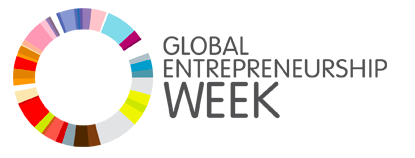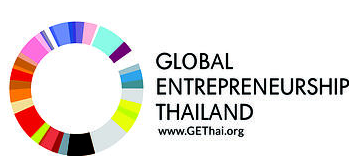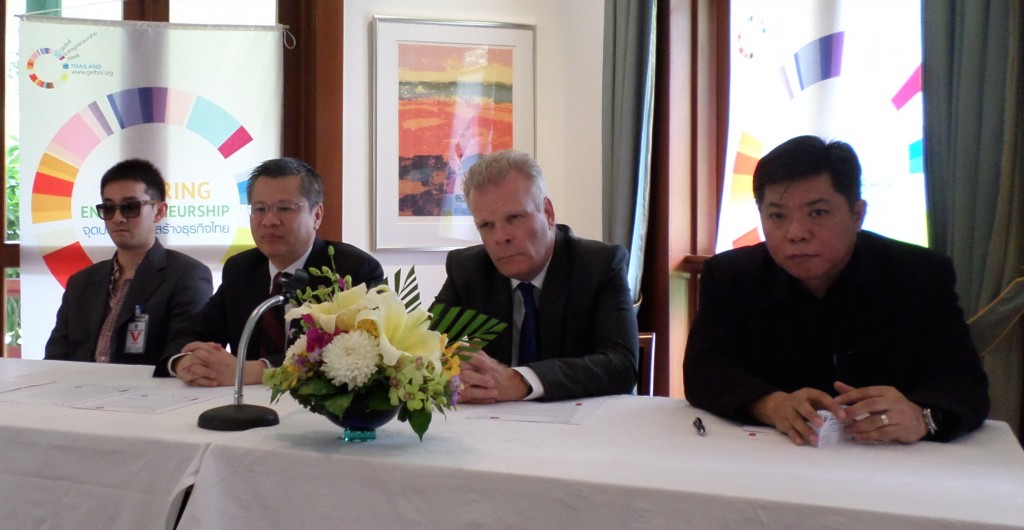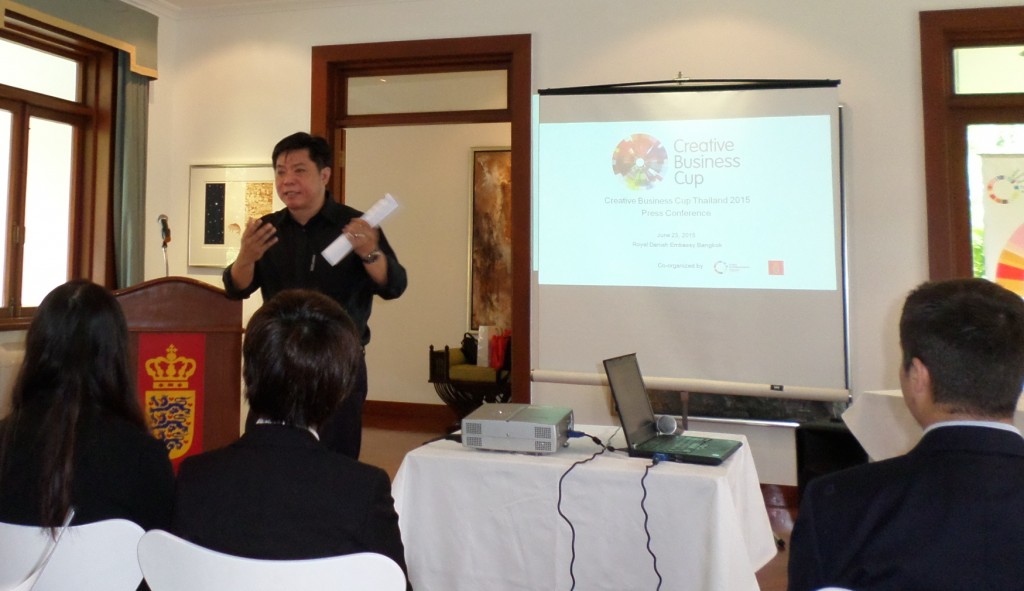
24 Jun, 2015
Thai tourism entrepreneurs invited to apply for global Creative Business Cup competition 2015
Bangkok, 23 June 2015 – Creative Thai entrepreneurs with good business ideas are being invited to apply for a contest that could take them to a global creativity championship in Copenhagen between Nov 17-18, 2015. It is a great opportunity for young Thai tourism professionals to take the concept of “Thainess” to a new level, especially as the definition of “creative industries” includes four sectors of direct relevance to travel & tourism: Leisure activities, Amusement Parks & Live Scenes, Art and crafts, and Gastronomy.
Other “creative economy” sectors include Design, Computer games, Music, Radio & TV, Architecture, Advertising, Film & Video, Content production, Books and the press.
 |
 |
 |
 At the Press conference, from right to left, Mr. Jirawat Tangkijngamwong, Danish Ambassador to Thailand Mr. Mikael Hemniti Winther, Mr. Steve Cheah and Mr Pratchaya Chatuphian |
 Mr. Jirawat Tangkijngamwong making his presentation |
The announcement inviting Thai applications for the Creative Business Cup (CBC) 2015, the world championship for creative entrepreneurs and a featured activity for Global Entrepreneurship Week (GEW), was made at a Press Conference on 23 June 2015 at the Danish embassy.
GEW is the world’s largest entrepreneurship campaign where representatives from 150 countries promote events and activities to inspire, engage and mentor the next generation of entrepreneurs. The competitive element, the CBC, was launched in 2012 with only 19 participating countries. By 2014, over 50 countries had signed up including a Thai contestant representing www.limpanzee.com.
Winners are selected by an international jury. The three criteria are the Originality and Creativity of the business concept and its Market potential.
In Thailand, the closing date for this year’s applications is 25 July 2015. The conditions and application form is available on website www.gethai.org. Shortlisted teams will receive online mentoring on their projects from global experts and investors and the winner will stand the chance to represent Thailand at the global finals.
The CBC host for Thailand is Global Entrepreneurship Thailand (GET).
According to the official media release, the Danish toy manufacturer LEGO, Cirque de Soleil from Canada and the Australian clothing brand Billabong all began as entrepreneurs with a revolutionary business ideas stemming from the creative industries.
- Creative industries are estimated to account for more than 7% of the world’s gross domestic product and are forecast to grow, on average, by 10% a year.
- Over the period 2000-2005, trade in creative goods and services increased at an unprecedented average annual rate of 7 per cent. World exports of creative products were valued at $424.4 billion in 2005 as compared to $227.5 billion in 1996
- In Europe, the creative industries 3% of the EU economy and 3% employment- the latter with an annual increase of 3.5% from 2000-2010. The rest of the industries in the EU achieved total employment growth of 1.0% in the same period
- In the UK, jobs in the creative industries grew twice as fast as in other industries
- Companies in other industries, working closely with the companies from the creative industries are more innovative. For example, the companies that have a high input from the creative industries, are 12 percentage points more product innovative than other firms.
- On a global scale, exports of creative products and services in the period 2002-2008 had an annual average growth of 14%.
The creative economy concept was introduced to Thailand under the government of Democrat Party Prime Minister Abhisit Vejjajiva in 2009, one year after the UN Conference on Trade and Development (UNCTAD) launched a report on the Global Creative Economy.
Danish Ambassador to Thailand Mr. Mikael Hemniti Winther said that creative industries “are perhaps not misunderstood but certainly undervalued and underestimated.” He said that demand for them will rise in future “as people get more and more wealthier they will need more and more activities to fill out their leisure time. Thailand is an obvious country to benefit from (this trend) if we pay more attention to it.”
He noted how Denmark, a country with a small population and few natural resources, has benefitted from this philosophy and is now a natural host for a competition in further advancing the cause of creative industries.
Global Entrepreneurship Thailand (GET) President and CBC Thailand Host, Mr. Steve Cheah said Thailand has great creative talent but the problem is to translate good ideas into sustainable businesses. He said the competition was a good opportunity to promote creative ties between Thailand and Denmark and put Thailand on the map of global creative talent.
Mr. Jirawat Tangkijngamwong, Director at the Thai Board of Trade and Chairman of its Committee for Lifestyle Products and Designs, said that as Thailand adapts to changes in the global economy and the process of ASEAN integration, it could no longer cite “low labour costs” as a competitive advantage. Instead, it had to focus on creativity and knowledge management.
“Technology has leveled the playing field and business has gone borderless. These days, size does not matter. It is all about who is smarter, who can adapt to change, who can capture the social media opportunity. It is a great chance for Thais to get ahead. We know a lot and are very smart but we don’t know how to commercialize it.”
Mr Pratchaya Chatuphian of limpanzee.com related his experiences as a Thai participation at the CBC 2014 final in Denmark.
He said that although he did not win, just being in Copenhagen was very useful for him. He said the “Thai ecosystem” had changed and now allowed a much more friendly environment for Thai start-ups to compete than two or three years ago. He said he hoped to see more companies from Thailand join the 2015 CBC competition.
Mr. Jirawat added there are now many contests in Thailand to encourage start-ups, and opportunities for young entrepreneurs to avail of help from mentors and advisors.
He said that the Thai government once focussed on helping the big companies and cash-rich investors. That mindset has been replaced by one that focuses on the small and medium sized enterprises, especially those doing more research & development, and creative design.
He said government agencies such as the Board of Investment, the Ministries of commerce, industry, science and technology have a number of schemes to helps SMEs, such as providing funding to participate in trade shows abroad. Private sector organisations such as the Board of Trade and the Federation of Thai Industries are also developing similar schemes.
Mr. Cheah said that the creative business clubs are now popping up in provincial cities of Thailand and ASEAN. He said it may be quite possible to hold an ASEAN creativity championship in future, too.
Further info:
Global Entrepreneurship Network (GEN) is a year-round platform of programs and initiatives created by the communities that celebrate Global Entrepreneurship Week each November. www.wearegen.co
Global Entrepreneurship Thailand (GET) is an entrepreneurship initiative focused on increasing the number of startups and the number of businesses in Thailand to scale up for AEC and the global market. www.gethai.org
Read more about Global Entrepreneurship Week GEW at www.gew.co.
The Ewing Marion Kauffman Foundation, which provides funding support for the global event, was established in the mid-1960s by the late entrepreneur and philanthropist Ewing Marion Kauffman. Based in Kansas City, Missouri, it is often referred to as the world’s largest foundation devoted to entrepreneurship. Read more at www.kauffman.org.
Center for Culture and Experience Economy (CKO) is an independent government-funded agency established in 2008 by the Danish Ministry of Economics and Business Affairs and the Ministry of Culture. It is the founder of the Creative Business Cup. Read more www.cko.dk/en/about-cko.



Liked this article? Share it!